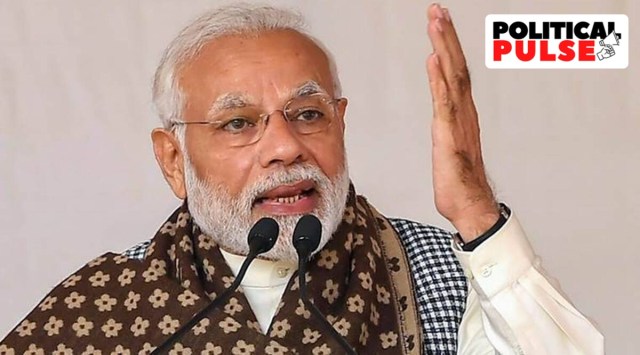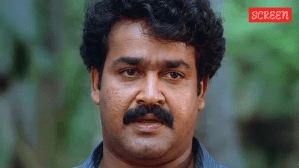‘Will win Kerala’: Does PM Modi’s maths add up?
BJP's vote share is now firmly in double digits, and it was runner-up in 7 seats in 2021 Assembly polls. What it now needs is a good ally, which might be easier said than done
 Prime Minister Narendra Modi said the results proved that the party was not seen as “anti-Christian” and said a BJP coalition would come to power in Kerala too. (File)
Prime Minister Narendra Modi said the results proved that the party was not seen as “anti-Christian” and said a BJP coalition would come to power in Kerala too. (File) HAILING the BJP’s performance in the recent elections in the three Northeast states, Prime Minister Narendra Modi said the results proved that the party was not seen as “anti-Christian” and said a BJP coalition would come to power in Kerala too.
Despite the importance the BJP attaches to Kerala, and its attempts there, the southern state has proved unbreachable for the party. The only time it ever won an Assembly seat was in 2016, but it lost this too to the CPI(M) in 2021. It has never won a Lok Sabha election in Kerala.
The Kerala Chief minister and a member of the CPI(M) Politburo, Pinarayi Vijayan, termed Modi’s statement as “overambitious”. Congress MLA and Leader of the Opposition V D Satheesan said the BJP has no space in Kerala. “It is the CPI(M) which is trying to give room to the BJP so as to weaken the Opposition,” he said.
The state’s politics remains bipolar, with the CPI(M)-led Left Democratic Front on one side, and the Congress-led United Democratic Front on the other. But, over the years, the BJP-led NDA’s vote share has grown in Kerala from 6.6 per cent in the 2011 Assembly elections to a high of 14.93 per cent in 2016, which fell to 14.4 per cent in 2021.
Last time, the party finished second in seven Assembly seats. In many other seats, the BJP got enough votes to tilt the results, with fielding of high-profile candidates or celebrities paying off for the party.
Modi’s statement comes against this backdrop, with an ally such as a Christian party expected to give the BJP just that extra push to lift it from the status of spoilsport (for either the LDF or UDF) to front-runner. Incidentally, even larger Hindu community organisations have escaped the party fold so far.
The Christian vote
Minorities make up nearly half the Kerala population, with Muslims 26 per cent and Christians around 18 per cent. Since Muslims are unlikely to go with the BJP, it is among the Christian parties that the BJP is hunting for allies.
The ground has opened up for this due to the decline of the regional party Kerala Congress, which had once dominated Central Kerala’s Christian politics. It has been left weakened by frequent splits, the death of veteran Christian political satrap K M Mani, and the exit of several senior Christian leaders of the Congress as well as Kerala Congress from active public life.
The BJP’s outreach programme, led by state and Central leaders, has included meeting the clergy of various Churches, including Bishops, and trying to find common cause on issues like “love jihad” (blamed on the Muslim community).
However, while the party has made some headway with the Syro-Malabar Catholics, its success has been constrained due to the failure to take up more bread-and-butter concerns of the community – such as the fall in the prices of natural rubber, increasing man-animal conflict, and worries regarding buffer zones for protected forest tracts.
In the last few years, the Church, particularly the powerful Kerala Catholic Bishops Council, has been at the forefront highlighting such concerns of the community engaged in farming.
Rubber, for example, is a big part of the farm-based economy of Central Kerala, where the BJP has been trying to make inroads. The rubber growers have been pleading with the Centre to curb the import of natural rubber and rubber components, with the domestic market depressed since 2013. However, the BJP-led Central government, that has been in power now for nearly 10 years, has largely ignored their grievances.
The Christian community also has high stakes in the hilly farm regions of Kerala, where their crops are increasingly threatened by the growing population of wild boars. Again, the Church has taken up their cause, demanding that the wild boar be declared a vermin, which would enable the state to control the menace. But the Centre last year rejected the proposal.
The most recent issue over which the Church has been protesting is the Pinarayi government’s plans to hold satellite surveys to mark human activities and structures within the 1-km proposed buffer zone for protected forest tracts. It has left residents across the state apprehensive about their holdings, and the BJP’s failure to tap into shows the RSS’s lack of usual ground-level connect, especially among the minorities.
The frequent reports of attacks on churches and missionaries in North India by outfits linked to the Sangh Parivar mean Christians remain suspicious of the RSS. Several Kerala Bishops had tried to mend fences with the BJP, due to the simple fact that it rules the Centre, but tension over activities of the Sangh Parivar outfits had left several embarrassed.
The clergy is also apprehensive about a backlash of the kind it saw from civil society over its “silence” on the long incarceration and subsequent death of Father Stan Swamy, who was arrested over the Elgar Parishad case.
Another factor that has driven a wedge between the Church and Sangh Parivar is the RSS’s stand on reservation benefits to Dalit Christians, a long-standing demand of the Church. The formation of a government committee under former Chief Justice of India K G Balakrishnan had kindled some hopes in Kerala, but the Sangh Parivar’s mass communication wing Vishva Samwad Kendra recently opposed such a quota.
The contest
The CPI(M), which has also been eyeing the Christian vote in the wake of the slide of both the Kerala Congress and the Congress, keeps raising the spectre of Sangh Parivar attacks on churches in North India. Following Modi’s claim regarding the BJP rise in Kerala, CPI(M) state secretary M V Govindan retorted: “The PM must first respond to the joint statement issued by retired civil servants (recently) that violence against Christians should be stopped immediately.’’
In fact, in the constituencies where the BJP has finished runner-up in recent Lok Sabha and Assembly elections, the Christians were not a factor. Be it Thiruvananthapuram, Palakkad, Thrissur or Kasaragod, the BJP gained by taking away Hindu votes from both the CPI(M) and Congress.
There is another big hurdle standing in the BJP’s way. The closer it gets to the Christian community by playing on Islamophobia, the more likely the consolidation by the Muslim community behind either the LDF or UDF. Both the CPI(M) and Congress, in fact, have been trying to fight off the BJP in Kerala by getting the Muslim votes to their side, apart from their usual vote bank.
Wary of the BJP’s attempts to expand in the South ahead of the 2024 Lok Sabha polls, the Muslims in Kerala have been keeping a close tab on the BJP bonhomie with Christians.
The BJP, however, has not let up on its efforts. Central party leaders make it a point to attend Christian events. On Wednesday, it’s the turn of Union minister Nitin Gadkari, who will be the chief guest at the anniversary celebrations of Catholic Church daily Deepika in Delhi.
- 01
- 02
- 03
- 04
- 05































